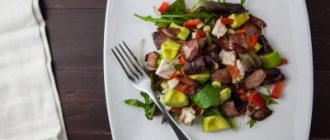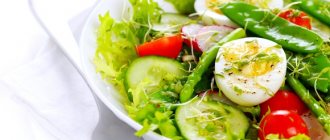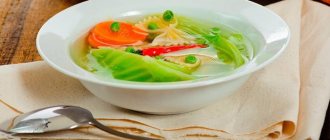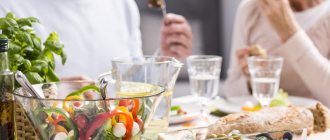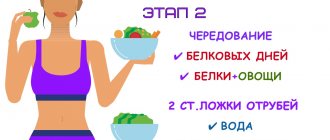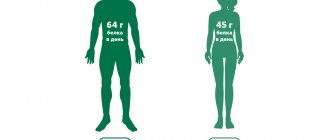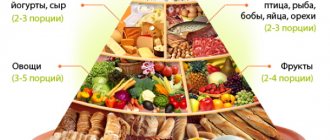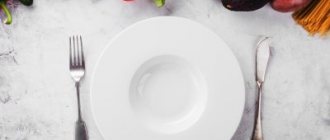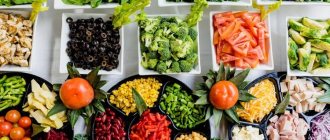Share:
Many stereotypes have formed around proper nutrition. Some associate it with strict restrictions, others believe that a healthy nutrition menu for every day is a pleasure available to people with above-average incomes. Finally, another stereotype is that only those who have health problems or are overweight need to eat right. Are these stereotyped ideas about PP correct? Is it easy to choose a healthy diet and what do you still have to give up? Read about it in our article.
General rules and principles of healthy eating
The first study on healthy eating was conducted in 1973 in Finland. Over the years of the experiment, in the region where the study was conducted (North Karelia), the mortality rate of the population from obesity, diabetes, and cardiovascular diseases decreased by 7 times. This is just one of many studies that prove the need for healthy eating.
We bring to your attention 10 basic principles that will help you create a healthy diet for every day, change your attitude towards food choice and food culture.
- Diet. To eat healthy, you should have at least 5 meals a day. This is breakfast, lunch, dinner and light snacks in between. It is optimal that no more and no less than 2.5 hours pass between meals. For convenience, until the regime becomes a habit, use checklists and mark each meal.
- A varied diet. Eat as many different vegetables and fruits as possible. The more vegetables on your plate and the brighter and more colorful it is, the better.
- Calorie content. The process of calorie absorption is individual for each organism and depends on the characteristics of metabolism. Instead of counting calories in each serving, keep a food diary and note in it every day what foods you ate and in what quantities, how it affected your condition, mood, and health. If this method seems difficult to you, use special programs and applications for calorie counting, but do not focus on them. The more you limit yourself, the more difficult it will be for you to get used to PP.
- Replacement of harmful products with useful analogues. Instead of white bread, buy whole grain bread, instead of sweet bars for a snack, choose 1-2 bananas, instead of instant cereal - cereal porridge.
- Studying the composition of products. Carefully read the ingredients of the products you choose in the supermarket. Buy products with natural ingredients.
- Elimination of harmful products. Eliminate chips, soda, sausage, sauces, mayonnaise, ketchup, and fast food from your diet forever. Go to the supermarket with a pre-compiled list so as not to be tempted by various “harmful things”.
- Preference for unprocessed foods . Eat more fresh vegetables and fruits than processed ones.
- More water throughout the day . It is advisable to drink at least 2 liters of water per day. Drink in small sips, slowly.
- Mandatory snacks . Fruits, nuts, bread, cottage cheese and any other light dietary products that help dull the feeling of hunger between main meals are required.
- Reduce salt intake . Salt retains excess water in the body and puts stress on the kidneys. Monitor the amount of salt you consume per day. Eliminate unhealthy pickles from your menu, such as dried or smoked fish. (read more about how to give up salt).
Fruits and berries
Fruits and berries up to 5% of the diet are not in season (let me remind you that our season is from late June to early September), and it is also not recommended to include them raw in the diet. They can be consumed in porridges, soups, desserts or as a separately prepared independent dish with spicy spices on agar-agar (an excellent second breakfast, afternoon snack, dinner). We remember that fruit is, first of all, water, fiber and easily digestible sugar, and we will look for and find vitamins in other healthy foods!
It is good to use dried fruits (sugars and fiber without water) as a sweet taste in dishes.
Raw fruits are not recommended to be combined with fermented milk products and consumed after protein meals! Because they interfere with the processing and digestion of proteins in the stomach.
If, despite my recommendations, you want to eat them raw, then the best time for this is from 11.00 to 12.00, 1.5–2 hours before lunch (not instead!). Since they always increase the acidity of gastric juice, which reaches its maximum by lunch time (12.00–14.00), and do not stay in the stomach for long.
How to choose the right menu?
A properly composed diet is the basis of health and well-being.
Menu selection rules:
- Calculation of basal metabolism. Calculate the required minimum calories for your body using special calculation formulas from the Internet. The required amount of calories depends on your gender, age, and physical activity during the day. You cannot fall below the minimum value obtained in the calculation.
- Protein counting. Optimal amount of protein: 1 gram per 1 kilogram of weight. For those losing weight, this norm should be doubled.
- Fat counting. Even if you are losing weight, you cannot completely eliminate fats from your diet. Replace them with healthy fats: olive oil, fatty fish. Optimal amount per day: 1 g per 1 kg of weight.
- Carbohydrate counting. Their amount is calculated based on the total number of calories per day. 1 gram of proteins and carbohydrates contains 4 kcal, 1 gram of fat contains 9 kcal. By subtracting protein and fat from your total calories, you will get the amount of carbohydrates you need per day.
In the first half of the day, it is recommended to eat foods rich in carbohydrates. These are cereal porridges with fruits or vegetables. In the afternoon, it is advisable to eat more fiber. Add vegetables and herbs to the main dish.
Vegetables
Vegetables can make up 15-30% of the diet, but in our cold climate they should not be eaten raw. They can be combined with all types of foods and eaten for dinner. Greens (parsley, cilantro, dill, lettuce) are not vegetables, and, of course, can be added fresh to dishes. Raw vegetables are hard-to-digest foods that can cause digestive problems. In the second half of summer, vegetables can be added a little raw to the diet, but, again, this is not suitable for everyone.
Menu options
For men
Table with examples of the optimal PP menu for middle-aged men:
| Day of the week | Daily diet |
| Monday | Breakfast: 1 boiled egg, buckwheat porridge, vegetable salad, green tea. Snack: a glass of kefir or a banana. Lunch: boiled meat, vegetable salad, berry or fruit compote. Snack: green tea with diet pastries or bread. Dinner: boiled or baked fish, vegetable salad, green tea with honey. |
| Tuesday | Breakfast: oatmeal with berries, pumpkin seeds, compote or tea. Snack: vegetable or beet salad with bread. Lunch: boiled chicken with buckwheat, vegetable salad, green tea. Snack: sandwich of whole grain bread and cheese, compote. Dinner: boiled meat, boiled potatoes, fresh vegetables. |
| Wednesday | Breakfast: omelet with green onions and dill, tea or compote. Snack: fruit or nuts. Lunch: steamed cutlet, vegetables, green tea puree soup or compote. Snack: dietary cottage cheese casserole with tea. Dinner: baked or boiled lean fish, vegetable salad, compote. |
| Thursday | Breakfast: omelet or fried eggs with asparagus, stewed vegetables, sweet tea. Snack: Banana or handful of nuts. Lunch: lean boiled meat, boiled or baked potatoes, fresh vegetables, green tea or compote. Snack: a sandwich of whole grain bread and cheese, feta cheese or cottage cheese with berries, tea. Dinner: boiled meat or steamed cutlet with vegetables, tea. |
| Friday | Breakfast: pearl barley porridge with milk and nuts. Snack: any fruit or berries Lunch: chicken or turkey fillet, vegetable soup, tea. Snack: bread with green tea or compote. Dinner: vegetable salad, stewed fish, water or compote. |
| Saturday | Breakfast: oatmeal with berries and fruits, sweet tea. Snack: grapefruit. Lunch: steam cutlet with buckwheat, vegetable puree soup, compote. Snack: diet cookies with tea. Dinner: vegetables, green tea, boiled lean meat. |
| Sunday | Breakfast: porridge with dried fruits (raisins), sweet tea. Snack: banana. Lunch: boiled chicken with side dish, tea. Snack: bread with kefir or milk. Dinner: boiled chicken, fresh vegetables, compote. |
Download the healthy nutrition menu for men here so that you always have it at hand.
For women
Table with weekly PP diet for women:
| Day of the week | Daily diet |
| Monday | Breakfast: oatmeal with berries and fruits, green tea. Snack: apple. Lunch: boiled fish, rice, fresh vegetables, compote. Snack: chicken breast and steamed vegetables. Dinner: low-fat cottage cheese, green tea. |
| Tuesday | Breakfast: oatmeal with berries, pumpkin seeds, compote or tea. Snack: cottage cheese with a spoon of honey. Lunch: chicken broth, vegetable salad, green tea. Snack: fruit. Dinner: boiled chicken fillet with fresh tomatoes. |
| Wednesday | Breakfast: oatmeal with berries and fruits, tea or compote. Snack: two oranges. Lunch: stewed vegetables and chicken breast, green tea or compote. Snack: dietary cottage cheese casserole with tea. Dinner: low-fat cottage cheese, compote. |
| Thursday | Breakfast: rolled oats with milk with berries, tea. Snack: natural yogurt without additives. Lunch: fish soup with potatoes. Snack: fresh vegetable salad with sour cream. Dinner: chicken breast with two fresh cucumbers, tea. |
| Friday | Breakfast: boiled potatoes, 1 egg, fresh cucumber. Snack: kiwi, tea without sugar. Lunch: rice and mushroom soup, hard cheese. Snack: cottage cheese and berry casserole. Dinner: stewed fish, seaweed, water or compote. |
| Saturday | Breakfast: omelet, unsweetened tea. Snack: apple, kefir. Lunch: boiled fish with rice, compote. Snack: shrimp with fresh vegetables. Dinner: low-fat cottage cheese. |
| Sunday | Breakfast: oatmeal with dried fruits (raisins), tea. Snack: banana, orange. Lunch: boiled chicken with vegetable casserole, tea. Snack: tomatoes, boiled shrimp. Dinner: steamed fish cutlets, brown rice, fresh vegetables, compote. |
A sample menu for women can be downloaded here so that it is always at hand.
Budget diet for a week
A healthy diet for every day is not as expensive as many people think. With just 1,000 rubles you can purchase groceries for a week, from which you will prepare healthy and wholesome meals for all seven days.
When you go shopping, be sure to buy:
Proteins:
- 1 dozen eggs;
- 1 liter of kefir;
- 300 grams of cottage cheese;
- 5 kg chickpeas;
- 1 kg chicken.
Carbohydrates:
- 1 kg buckwheat;
- 0.5 kg oatmeal;
- 1 kg apples;
- 1 kg bananas;
- 1 kg of oranges;
- 1 kg of white cabbage;
- 1 kg carrots;
- 1 kg frozen green beans.
Fats:
- 0.5 kg mackerel.
Spices, natural baked goods, sweets:
- 300 g honey;
- ground black pepper;
- Provencal herbs;
- turmeric;
- cinnamon;
- pumpkin seeds;
- dried ginger and garlic;
- sesame.
Examples of simple dishes from a budget grocery list
For breakfast:
- oatmeal with apple and cinnamon;
- omelette with green beans;
- smoothie made from kefir, cottage cheese, banana and cinnamon.
For lunch:
- boiled chicken breast with buckwheat and carrot and cabbage salad;
- chickpeas with stewed cabbage and sesame seeds;
- stewed chicken with pumpkin seeds and vegetables.
For dinner:
- chicken fillet with carrot and cabbage salad;
- baked fish with vegetables;
- cottage cheese with pumpkin seeds and kefir.
Ideal snacks include: apples or bananas, a fried egg with bread, a vegetable salad, a sweet salad of apple, honey and carrots.
Animal proteins
Should make up no more than 5% of the daily diet. According to WHO recommendations, the daily amount of protein required by an adult is only 0.9 g per kg of body weight; children and pregnant women - 1.5–2.0 g per kg of body weight.
It is for the reason stated above that it is recommended to take hard-to-digest animal proteins (meat and fish dishes) separately or in combination with vegetables (but not potatoes) between 12.00 and 14.00.
Meat in combination with any carbohydrates (pasta, fried potatoes, cereals) is a completely incompatible option. Because carbohydrates must be digested not in the stomach, but in the intestines. Accordingly, after such a lunch you should not eat dessert and wash down your lunch with cold water, sugar-containing drinks and juices. It is recommended to use spices and herbs in the preparation of meat dishes, which help to digest heavy protein more easily.
Remember that eating meat/fish at night is not healthy! In general, it is better to have dinner with food that is light on the stomach or not to have dinner at all! The recommended time for the last meal is 17.00–19.00.
Pork, incubator-raised chicken and turkey, and Norwegian salmon are not recommended at all (preference should be given to ocean-dry/trailer-frozen white fish). Where can I get it? You can find everything on the Internet!
What is better to refuse on PP?
The menu of proper healthy eating for every day, as you have already noticed, does not contain sweets, flour, homemade and store-bought baked goods and many other products.
What else will you have to give up when choosing proper nutrition:
- oatmeal and other types of cookies;
- sparkling water, especially sweet;
- fast food dishes: store-bought dumplings, dumplings;
- cheap pasta that cooks in less than 7 minutes;
- fried potatoes and french fries;
- sunflower and corn oil;
- white bread, buns;
- fruit juices from the supermarket;
- energy bars;
- oat, corn, buckwheat flakes;
- mayonnaise, ketchup, sauces, mustard;
- low-fat store-bought yoghurts;
- ice cream.
These products contain many artificial ingredients: trans fats, preservatives, flavor enhancers, sweeteners, which not only threaten your figure, but also cause serious harm to your health.
Other additional tips
It’s not difficult to choose an approximate healthy nutrition menu for every day. It is much more difficult not to break down and return to your previous gastronomic habits.
A few simple recommendations will help you turn PP into a habit:
- Understand that proper nutrition is not a newfangled diet for a couple of weeks that will make your figure slim and beautiful from the first day. This is a lifestyle that will keep you healthy, youthful and beautiful, and eliminate problems with excess weight, hair, and skin.
- Write down on a piece of paper the goals you want to achieve by sticking to the PP.
- Transition to a healthy diet gradually. Get rid of sausages, sausages, mayonnaise on the refrigerator shelf, start adding a little less salt to your food, avoid chips, snacks and other “goodies”. Introduce new vegetable dishes into your diet, discover unfamiliar tastes.
- Don't focus on eating right. Broaden your horizons, increase your range of interests.
- Don't beat yourself up over your relapse. Analyze the reasons why you bought crackers or a chocolate bar (hunger, lack of calories in your morning breakfast).
- Carry healthy snacks with you (apples, bananas, nuts, dried fruits) so that in case of sudden hunger you don’t resort to something “nasty”.
Breakfast
Whole grain cereals are “correct”, slowly digestible carbohydrates.
They are rich in all the ingredients we need: proteins, fats, carbohydrates, microelements, vitamins. And most importantly, they not only nourish tissues, but give energy to our body. Food should be warm, well-cooked, appetizing, giving a feeling of fullness.
We remember that a properly prepared breakfast feeds the body during the most active part of the day.
It is not recommended to use sour taste in the morning meal, especially on an empty stomach (fermented milk products, even with sugar, freshly squeezed juices). In the morning there should be a mostly sweet taste (all cereals have a sweet taste, but there are some that are more or less sweet in perception), necessary to harmonize the organs that are actively working at this time: the stomach, pancreas/spleen. An exception may be individual recommendations from a doctor for the period of treatment or cleansing procedures.
It is recommended not to leave home (to kindergarten, school, college, work) without a home-made, balanced breakfast.
A good breakfast is the key to health!
